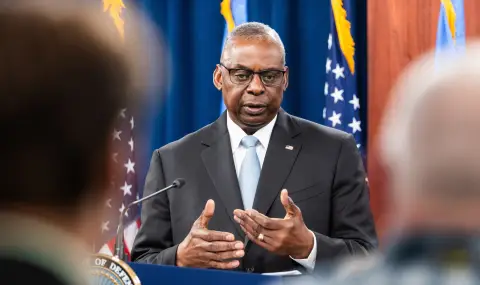US Defense Secretary Lloyd Austin has drawn attention to the threat from China in the Asia-Pacific region, trying to allay concerns that the conflicts in Ukraine and Gaza have distracted from US commitments in Asia, reports Reuters and News.bg.
Austin, speaking at the annual security meeting "The Shangri La Dialogue" in Singapore, met with his Chinese counterpart Dong Jun on Friday to ease tensions on issues from Taiwan to China's military activity in the South China Sea.
There is growing concern that Washington's focus on helping Ukraine against the Russian invasion and supporting Israel's war in Gaza, while trying to prevent an escalation of the conflict, has diverted attention from the Indo-Pacific region.
"Despite these historic clashes in Europe and the Middle East, the Indo-Pacific region remains our priority," Austin said in a speech that was apparently aimed at highlighting the administration's legacy in the region as President Joe Biden's first term nears its end.
"Let it be clear: The United States can only be secure if Asia is secure," Austin said. "That is why the United States has long maintained its presence in this region."
Austin emphasized the importance of alliances in the region and the peaceful resolution of disputes through dialogue rather than coercion or conflict. In his speech, he attacked China's actions in the region, including in the South China Sea, without naming China directly.
In response, Chinese Lt. Gen. Jing Jianfeng said that the US strategy for the Indo-Pacific region is aimed at creating divisions, provocations and undermining stability.
"It only serves the selfish geopolitical interests of the US and goes against the trend of history and the shared aspirations of regional countries for peace, development and mutually beneficial cooperation," said Jing.
During their meeting on Friday, Dong warned Austin that the US should not interfere in China's relations with Taiwan, saying China considers the democratically-ruled island its territory.
Some US officials say Beijing has grown bolder in recent years, recently launching what it describes as "punitive" exercises around Taiwan, sending heavily armed warplanes and conducting mock attacks after the inauguration of Lai Ching-te as president of Taiwan.
About $8 billion of U.S. funding is earmarked for countering China in the Indo-Pacific region as part of a supplemental funding bill passed by lawmakers.
Philippines President Ferdinand Marcos Jr. on Friday condemned illegal, coercive and aggressive actions in the South China Sea, a disputed ocean territory that China has been flooding with coast guard ships in recent months.
The Philippines, a vast archipelago with close historical ties to the US and close geographic proximity to China, is at the center of an intensifying power struggle between Washington and Beijing.
Austin said the harassment the Philippines is being subjected to is dangerous and stressed that the mutual defense treaty between the US and Manila is ironclad. He said the goal is to keep tensions between Beijing and Manila from spiraling out of control.
"America will continue to play a vital role in the Indo-Pacific alongside our friends in the region we share and care so deeply about," Austin said.
General Jing said these alliances contribute to instability in the region.
"It is natural for neighbors to have arguments sometimes, but we must resolve disagreements through dialogue and consultation, not by inviting wolves into our house and playing with fire," he said.
